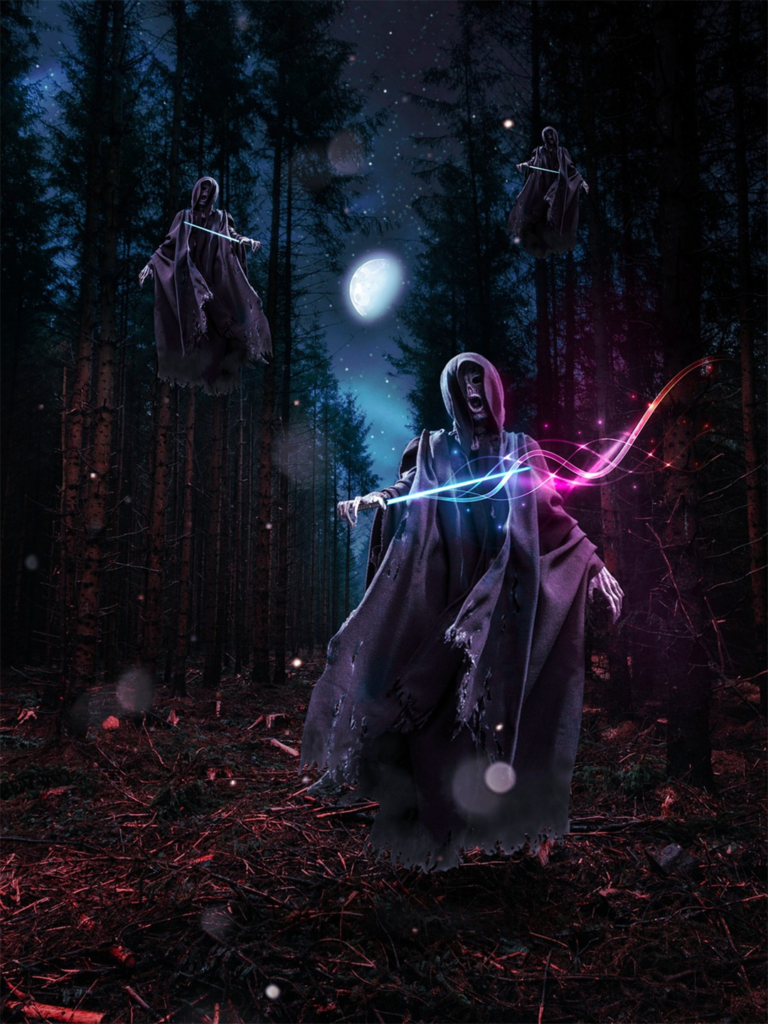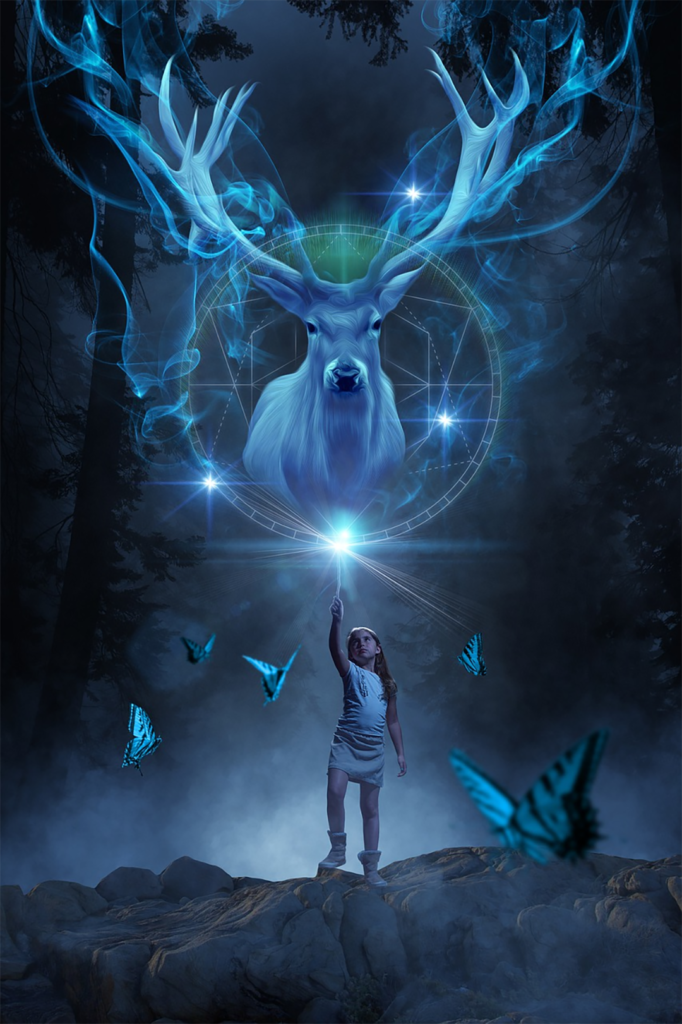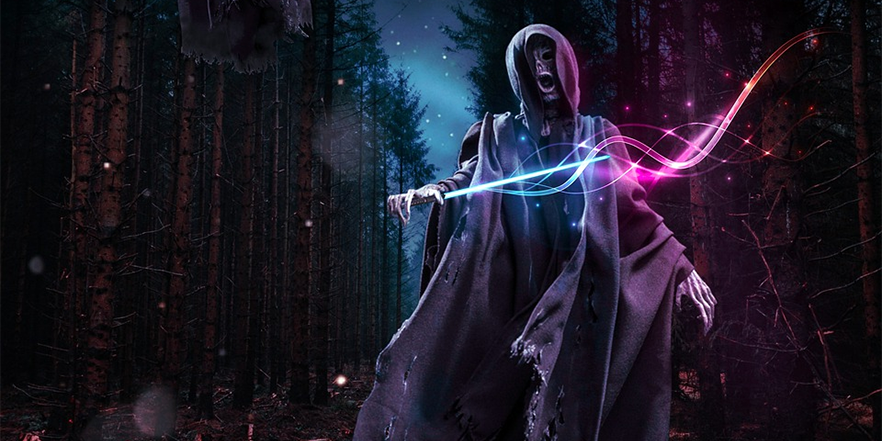
“Dementors are among the foulest creatures that walk this earth. They infest the darkest, filthiest places, they glory in decay and despair, they drain peace, hope, and happiness out of the air around them. Even Muggles feel their presence, though they can’t see them. Get too near a Dementor and every good feeling, every happy memory will be sucked out of you. If it can, the Dementor will feed on you long enough to reduce you to something like itself—soul-less and evil. You’ll be left with nothing but the worst experiences of your life.”
—J.K. Rowling, Harry Potter and the Prisoner of Azkaban
In an interview from 2000, Harry Potter author J.K. Rowling confirmed that the dementors of the magical world reflected her own experience with depression. “That is exactly what they (dementors) are. It was entirely conscious. And entirely from my own experience. Depression is the most unpleasant thing I have ever experienced. It is that absence of being able to envisage that you will ever be cheerful again. The absence of hope. That very deadened feeling, which is so very different from feeling sad. Sad hurts but it’s a healthy feeling. It’s a necessary thing to feel. Depression is very different.”
So many have been struggling with depression, anxiety and post-traumatic stress disorders (PTSDs) since the onset of COVID-19, when we were launched into a protracted death watch of over 500,000 in the U.S. and 2.5 million world-wide. Our front-line health care workers, teachers, social workers and counselors are stretched beyond their limits. Added to the challenges of pandemic isolation and chronic loneliness are the lingering wounds of immigrant maltreatment and institutionalized racial injustice, food insecurity, job loss, lack of adequate healthcare, contentious elections, the Capitol insurrection and ongoing struggles for the soul of democracy. Then there is the decimation of planet Earth, including the ravaging of Earth, air and water wrought by our own excess, greed and waste, and the deleterious effects of climate change, including rampant wildfires, floods, earthquakes, hurricanes and derechos. Oh my. We’ve got ourselves a maelstrom—a “whirling storm” of eco-grief and solastalgia, depression, anxiety, collective trauma and PTSDs. That’s not even counting the “normal” losses of family deaths, deaths of our beloved creature-kin and arbor elders, missed family birthdays, anniversaries, graduations, marriages and so many other daily experiences we are prevented from ritualizing with the companionship of friends and family members. It’s like the dementors are sucking the life and soul out of our very being, attacking our communal breath, threatening to erase the embrace of loved ones, family members and friends that we require to sustain us. And don’t even talk to me about the loss of our arbor-elders since the derecho. If you live in or near Cedar Rapids, and you’ve been “pining” (<L. poena, “suffering”) for our fallen trees, you will know that the loss we are suffering is as perennial as the pines themselves.
Alas, there are those truly well-meaning, often sainted purveyors of “Oh, it’s not so bad” platitudes who will insist on omnipresent silver linings, almost immediate and automatic responses of “Look on the bright side, bud!” They might even project an aura of “tsk, tsk, tsk,” as though it were almost shameful to stay with the trouble of feeling depressed and overwhelmed because it makes everyone just a wee bit uncomfortable. So, many people cope with their loss, depression and perennial sadness by stuffing it, postponing grief, denying that we as a people are suffering collective trauma and require our metaphorical 40 years in the desert to wander around in the cloud of unknowing, pissing and moaning about how bad the food tastes, and where are we going and when will this be over, and wouldn’t it be better to be back in Egypt, where yes, we were enslaved, but at least we still had meat for food rather than this tasteless manna (Numbers 11:1–6)? Perhaps it is true that “All shall be well,” Julian of Norwich, and “all manner of thing shall be well.” But we still need time to be here now, to groan and wail and ponder, and to sit on our proverbial dung heap for a while, Job (Job 2:8). We are only now just beginning to open our eyes to our own collective and personal trauma and how it pools within us and bubbles up when we become still, quieting ourselves, and allowing ourselves to go deeper.
Psychologists and counselors are well aware how hosting trauma and unprocessed grief in our bodies causes complex, related physiological maladies.
“The symptomatology of PTSD. In PTSD a traumatic event is not remembered and relegated to one’s past in the same way as other life events. Trauma continues to intrude with visual, auditory, and/or other somatic reality on the lives of its victims. Again and again they relive the life-threatening experiences they suffered, reacting in mind and body as though such events were still occurring. PTSD is a complex psychobiological condition.”
—Babette Rothschild, The Body Remembers: The Psychophysiology of Trauma and Trauma Treatment, 2000
“As long as you keep secrets and suppress information, you are fundamentally at war with yourself … The critical issue is allowing yourself to know what you know. That takes an enormous amount of courage … Traumatized people chronically feel unsafe inside their bodies. The past is alive in the form of gnawing interior discomfort. Their bodies are constantly bombarded by visceral warning signs, and, in an attempt to control these processes, they often become expert at ignoring their gut feelings and in numbing awareness of what is played out inside. They learn to hide from their selves.”
—Bessel van der Kolk, M.D., The Body Keeps the Score: Brain, Mind, and Body in the Healing of Trauma, 2014
Dreamwork often reveals our suppressed trauma and grief, and processing our dreams can bring about new insights for healing and transformation.
Dementors = Death is Nigh: I am in deep darkness, lucid in my dream, while an unknown assailant, stalker, or dark figure hovers over the bed, ready to suffocate me with a pillow. Paralyzed with terror, although I know I am dreaming, I am keenly aware of the danger lurking, and trying to scream for help, but my cries are muffled screams, and I finally rouse myself in anguish, the raking screams still wrenching themselves from my body’s heart chakra. I fall deeply asleep again, and there by my bedside is my beloved canine, whose breathing is labored and who is so weak she cannot raise herself on her hind quarters. Lifting her body and cradling her gently, I hold her close to my heart and massage her chest, where I can feel the death rattle reverberating with each breath. “NOOOO!” I groan loudly, the raw grief and aching loss pouring from my body as I awake with empty arms. The dawning of the lingering grief floods me with tears as they spill out upon the dream journal. How will I honor this pain?
Unless we honor our pain and ritualize its place in our life, it finds its way to every crevice, nook, and cranny of our consciousness. Our whole life can become a living nightmare, one unhealed wound, bound up with bottomless pits of grief, betrayal by friends, loss of relationship, and every experience of loss, rejection, disillusionment and failure all congealed into one stalking figure. And, if ignored, it can consume and suffocate what is left of our life-force, our holiest spirit. If honored, it can be a catalyst for healthy movement, for learning, changing and growing.
What comes next? “Anticipating the Advocate,” or as Harry Potter fans might say, “Summoning a Patronus.”
When Harry is learning to face the dementors, his favorite professor, a werewolf, teaches him about summoning a Patronus, a kind of protective force, a loving presence.
“The spell I am going to try and teach you is highly advanced magic, Harry—well beyond Ordinary Wizarding Level. It is called the Patronus Charm. The Patronus is a kind of positive force, a projection of the very things that the Dementor feeds upon—hope, happiness, the desire to survive.”
—Prof. Remus J. Lupin speaking to his student, Harry Potter, from J.K. Rowling, Harry Potter and the Prisoner of Azkaban
 The Patronus appears as a more-than-human animal, in Harry’s case, a magnificent stag bursting forth as a wisp of silvery light to protect himself and all those besieged by dementors. The Patronus incantation, Expecto Patronum (a Latin phrase) means, “I await/expect/anticipate a protector/guardian/patron/advocate.” In Harry Potter and the Order of the Phoenix, Harry summons his Patronus with a very powerful memory indeed, the memory of the love of his closest friends, Ron and Hermione.
The Patronus appears as a more-than-human animal, in Harry’s case, a magnificent stag bursting forth as a wisp of silvery light to protect himself and all those besieged by dementors. The Patronus incantation, Expecto Patronum (a Latin phrase) means, “I await/expect/anticipate a protector/guardian/patron/advocate.” In Harry Potter and the Order of the Phoenix, Harry summons his Patronus with a very powerful memory indeed, the memory of the love of his closest friends, Ron and Hermione.
“He could smell the dementor’s putrid death-cold breath, filling his own lungs, drowning him—Think … something happy … But there was no happiness in him … The dementor’s icy fingers were closing on his throat—the high-pitched laughter was growing louder and louder, and a voice spoke inside his head—’Bow to death, Harry … it might even be painless … I have never died …’ He was never going to see Ron and Hermione again—And their faces burst clearly into his mind as he fought for breath—’EXPECTO PATRONUM!’”
—J.K. Rowling, Harry Potter and the Order of the Phoenix
All of us need an advocate, and a way to come back to our breath. For some of us, summoning a very powerful, very happy memory can be in and of itself a challenge. When grief or re-lived trauma threatens to overwhelm us, it might feel difficult to remember anything good about our lives, much less to breathe into the palpable Love that forms a protective circle around us. If we can connect with our gratitudes and our authentic relational selves, the pathway often opens into daylight. It’s at that point that we feel the love of an advocate, a true and fiercely loyal friend, someone who takes our part, an enduring relationship of love that reminds us how treasured we are, and how held.
In Christian mythos, it is the promise of an Advocate that remained with the community after Jesus’ death and resurrection that sustained his followers in their hour of need.
“And I will ask the Father, and he will give you another Advocate (<Greek, parakletos = advocate/defense attorney/intercessor) to be with you always, the Spirit of truth, which the world cannot accept, because it neither sees nor knows it. But you know it, because it remains with you, and will be in you. I will not leave you orphans; I will come to you.”
—John 14:16-18
“But because I told you this, grief has filled your hearts. But I tell you the truth, it is better for you that I go. For if I do not go, the Advocate will not come to you. But if I go, I will send him to you.”
—John 16:6-7
Summoning the Patronuses = Dawn is Breaking: Wolfie and Albie are scampering delightfully through the stream in my side yard, our erstwhile Garden of Eden, lapping up sprays of fresh water from the head of the waterfall, running up and down the length of the sparkling water, weaving among the trees and flowers, yipping and vocalizing, “Come play with us, Mom!” And I come running to join them, collapsing with laughter and joy as they pounce on me, nipping my ears and covering me with kisses and mud. Sweetness and Light. I have summoned my advocates. How will you summon yours?
 —Laura Weber, Prairiewoods associate director and retreats coordinator
—Laura Weber, Prairiewoods associate director and retreats coordinator


